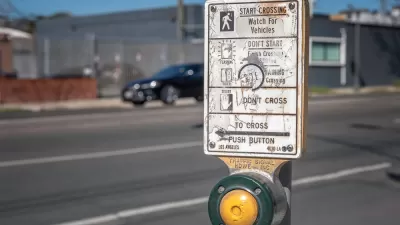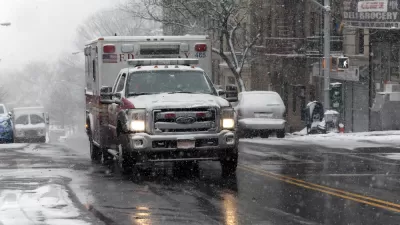A new study that compares how each of the 50 states regulates dangerous motorist behaviors has found that those with the toughest laws have the least traffic deaths. So why don't more states adopt “evidence-based policies”?
"According to a new paper published in the journal Public Health, the states with the toughest driving laws saw an average 14.5 percent decrease in traffic fatalities compared to those with the most relaxed regulations," reports Sarah Goodyear.
Why would some states choose not to adopt policies that have been shown to reduce fatalities? Arguments based on civil liberty grounds my be one reason.
"Strict regulations on texting, or blood alcohol content, or graduated licenses, are sometimes opposed as intrusions on personal freedom," writes Goodyear. "But Silver says that 'nanny state' arguments commonly leveled against some other public health regulations don’t really make sense when applied to driving laws."
“People driving hit other people,” she says. “They are, in turn, hit by others. They have other people in those cars who don’t always have a choice to be there. That seems slightly different than arguing over the size of soda cups. Getting it wrong means that there are such egregious consequences. There are fatalities.”
FULL STORY: Across the 50 States, a Big Disparity in Road Safety

Planetizen Federal Action Tracker
A weekly monitor of how Trump’s orders and actions are impacting planners and planning in America.

Restaurant Patios Were a Pandemic Win — Why Were They so Hard to Keep?
Social distancing requirements and changes in travel patterns prompted cities to pilot new uses for street and sidewalk space. Then it got complicated.

Map: Where Senate Republicans Want to Sell Your Public Lands
For public land advocates, the Senate Republicans’ proposal to sell millions of acres of public land in the West is “the biggest fight of their careers.”

Maui's Vacation Rental Debate Turns Ugly
Verbal attacks, misinformation campaigns and fistfights plague a high-stakes debate to convert thousands of vacation rentals into long-term housing.

San Francisco Suspends Traffic Calming Amidst Record Deaths
Citing “a challenging fiscal landscape,” the city will cease the program on the heels of 42 traffic deaths, including 24 pedestrians.

California Homeless Arrests, Citations Spike After Ruling
An investigation reveals that anti-homeless actions increased up to 500% after Grants Pass v. Johnson — even in cities claiming no policy change.
Urban Design for Planners 1: Software Tools
This six-course series explores essential urban design concepts using open source software and equips planners with the tools they need to participate fully in the urban design process.
Planning for Universal Design
Learn the tools for implementing Universal Design in planning regulations.
Heyer Gruel & Associates PA
JM Goldson LLC
Custer County Colorado
City of Camden Redevelopment Agency
City of Astoria
Transportation Research & Education Center (TREC) at Portland State University
Camden Redevelopment Agency
City of Claremont
Municipality of Princeton (NJ)





























